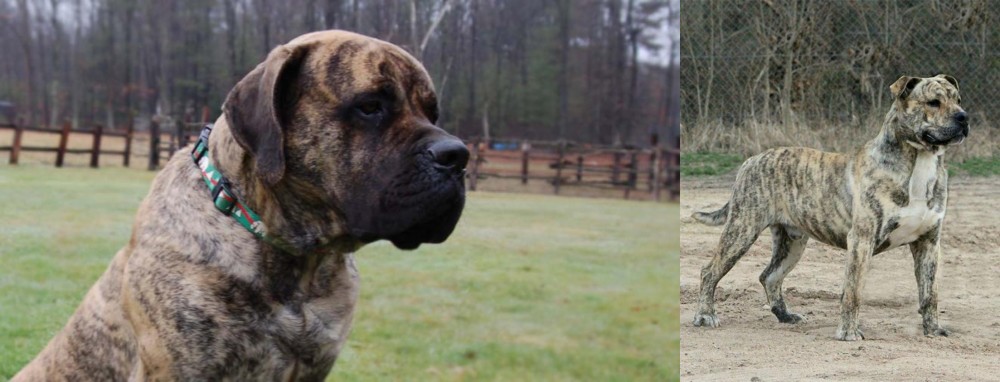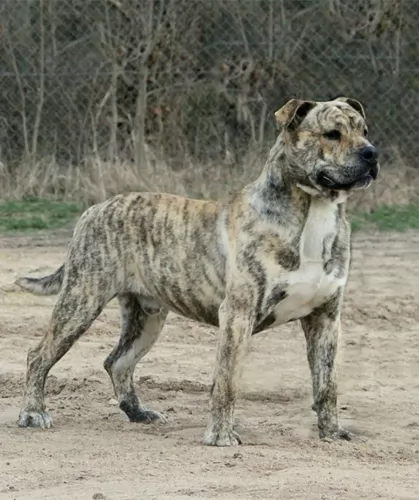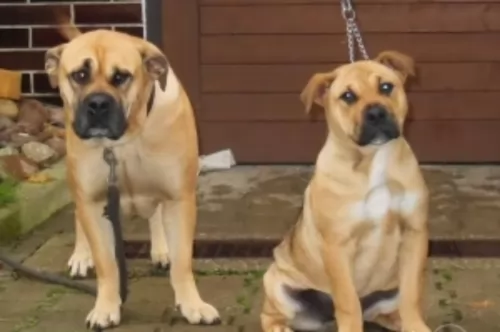 Petzlover
Petzlover American Mastiff is originated from United States but Perro de Presa Mallorquin is originated from Spain. American Mastiff may grow 33 cm / 13 inches higher than Perro de Presa Mallorquin. American Mastiff may weigh 51 kg / 113 pounds more than Perro de Presa Mallorquin. Both American Mastiff and Perro de Presa Mallorquin has same life span. Both American Mastiff and Perro de Presa Mallorquin has same litter size. Both American Mastiff and Perro de Presa Mallorquin requires Low Maintenance.
American Mastiff is originated from United States but Perro de Presa Mallorquin is originated from Spain. American Mastiff may grow 33 cm / 13 inches higher than Perro de Presa Mallorquin. American Mastiff may weigh 51 kg / 113 pounds more than Perro de Presa Mallorquin. Both American Mastiff and Perro de Presa Mallorquin has same life span. Both American Mastiff and Perro de Presa Mallorquin has same litter size. Both American Mastiff and Perro de Presa Mallorquin requires Low Maintenance.
 The history of the American Mastiff is entirely tied to the old European Mastiffs but in particular the English Mastiff. The developers of the American Mastiff crossed the English Mastiff with the Anatolian Mastiff at the Ohio kennel, Flying W Farms. The founder of this breed is Fredricka Wagner. Because of this the English Mastiff and the American Mastiff look very much alike. The difference between the two is that the American Mastiff was bred to have less health concerns than the English Mastiff and without the drooling. In 2000 the CKC acknowledged that the American Mastiff and the English Mastiff were separate breeds.
The history of the American Mastiff is entirely tied to the old European Mastiffs but in particular the English Mastiff. The developers of the American Mastiff crossed the English Mastiff with the Anatolian Mastiff at the Ohio kennel, Flying W Farms. The founder of this breed is Fredricka Wagner. Because of this the English Mastiff and the American Mastiff look very much alike. The difference between the two is that the American Mastiff was bred to have less health concerns than the English Mastiff and without the drooling. In 2000 the CKC acknowledged that the American Mastiff and the English Mastiff were separate breeds.
 Known by several other names such as Majorca Mastiff, Perro Dogo, Ca de Bou and Mallorquin Bulldog among others, the Perro de Presa Mallorquin was almost extinct after World War II.
Known by several other names such as Majorca Mastiff, Perro Dogo, Ca de Bou and Mallorquin Bulldog among others, the Perro de Presa Mallorquin was almost extinct after World War II.
The British brought their own dogs with them into the Balearics, crossing them with native mastiffs. They were used for fighting, explaining why this dog also got the name Ca de Bou as it means Bull Dog.
It is believed that the dogs were crossed with the Perro de Pastor Mallorquin, Alano Espanol and the Bulldog.
 This crossing of the English Mastiff and the Anatolian Mastiff resulted in a Mastiff with a much drier, less drooling mouth than the other Mastiffs. This is a giant, massive dog – powerful and muscular. With a wide head that is rectangular rather than square. Their eyes are dark amber, and their ears are high on their head and rounded. With a medium size muzzle, black mask and heavy head, the American Mastiff is a handsome dog.
This crossing of the English Mastiff and the Anatolian Mastiff resulted in a Mastiff with a much drier, less drooling mouth than the other Mastiffs. This is a giant, massive dog – powerful and muscular. With a wide head that is rectangular rather than square. Their eyes are dark amber, and their ears are high on their head and rounded. With a medium size muzzle, black mask and heavy head, the American Mastiff is a handsome dog.
Their chest is broad, deep with ribs that extended backward. He has strong legs that are parallel and wide set. He also has a long tail. Puppies of the American Mastiff are born almost black and as they grow their coat color lightens. In addition, it is important that they have a wrinkled forehead as well and a scissors bite is preferred.
 The Perro de Presa Mallorquin is a strong medium-to-large sized deep chested dog standing at between 52 and 58cm in height and weighing between 30 and 39kg, both male and female.
The Perro de Presa Mallorquin is a strong medium-to-large sized deep chested dog standing at between 52 and 58cm in height and weighing between 30 and 39kg, both male and female.
This is a molosser-type dog with a strong, powerful build and large head. The skin around the face is thick and loose. The coat of the dog is short and rough and the color is fawn to light brown and reddish tan shade He can also be brindle too or black with tan markings.
The jaw is strong, the ears short and floppy though they have always been traditionally cropped. When left they can be folded backward. The tail is long, set low and reaches to the hock.
This is an intelligent dog who is going to require training and socialization if you want to manage it properly. Training and socializing a dog can be very helpful and help a dog like this to be more obedient and well behaved.
As a puppy growing up with kids who have been taught to treat animals kindly and with respect, the Perro de Presa Mallorquin can get on well with children. However, if you’re bringing an older dog into your home, the very nature of the dog may mean it not getting on with children.
This dog is quiet by nature and will be loving and loyal towards his owner, being protective towards him. He is strong-willed and will do best with a strong, firm, kind, patient dog owner who is consistent.
He is active and will fit into life in the suburbs or the countryside as opposed to life on a tiny property in the city.
 A love of children and devotion to his pack (family) is bred into the American Mastiff. He is non-aggressive unless you threaten his family or his children. Then he becomes courageous, protective and defensive. This is a gentle giant most of the time, however due to size and the need for strong leadership, the American Mastiff should be socialized and trained early. If they are socialized and trained they will be calm, gentle dogs. They will remain protective and alert, but they will be friendly with strangers. They love to please their people and being highly intelligent they learn fast.
A love of children and devotion to his pack (family) is bred into the American Mastiff. He is non-aggressive unless you threaten his family or his children. Then he becomes courageous, protective and defensive. This is a gentle giant most of the time, however due to size and the need for strong leadership, the American Mastiff should be socialized and trained early. If they are socialized and trained they will be calm, gentle dogs. They will remain protective and alert, but they will be friendly with strangers. They love to please their people and being highly intelligent they learn fast.
 Your Perro de Presa Mallorquin is a loving dog, albeit it a bit stubborn. The key to having a dog with a sound temperament is to have him trained and socialized as this will do him the world of good and make him obedient and more balanced.
Your Perro de Presa Mallorquin is a loving dog, albeit it a bit stubborn. The key to having a dog with a sound temperament is to have him trained and socialized as this will do him the world of good and make him obedient and more balanced.
Irresponsible dog owners like to tie dogs like this up and leave them in the yard day after day to guard the home. They’re to blame when the dog becomes bored, frustrated and destructive.
Brought up correctly and given the right amount of love and care, the Perro de Presa Mallorquin is a brave, confident, quiet dog that can become a loyal and loving pet and companion.
 American Mastiffs seem to have fewer health issues than other larger giant breed dogs. However, they can experience allergies as many large, wrinkled dogs do. They also might have a tendency toward eye issues, hip dysplasia, cancer and heart disease. Bloat might be the most life-threatening issue many American Mastiffs experience.
American Mastiffs seem to have fewer health issues than other larger giant breed dogs. However, they can experience allergies as many large, wrinkled dogs do. They also might have a tendency toward eye issues, hip dysplasia, cancer and heart disease. Bloat might be the most life-threatening issue many American Mastiffs experience.
 To avoid some of the common dog illnesses there are, you want to give your pet the best care possible. Of course there are always some dog illnesses that plague a dog and where he will require veterinary intervention. Hip dysplasia is one and larger dogs are more prone to getting this joint disease which can be very debilitating for your dog.
To avoid some of the common dog illnesses there are, you want to give your pet the best care possible. Of course there are always some dog illnesses that plague a dog and where he will require veterinary intervention. Hip dysplasia is one and larger dogs are more prone to getting this joint disease which can be very debilitating for your dog.
Other health issues can include osteosarcoma and lymphoma which are types of cancer Eye problems such as ectropion or entropion of the eyelids is where you'll find the eyelids turning either outwards or inwards. Also be aware of cataracts of the eyes as well as Cherry eye.
 Giant breeds like the American Mastiff are known for growing rapidly as a puppy and therefore proper feeding and nutrition is essential. The slower your American Mastiff grows, the better. Make sure your puppies get enough phosphorous and calcium in their high calorie diet. Free feeding is not recommended. Feed puppies up to 4 small meals per day and feed adults twice a day.
Giant breeds like the American Mastiff are known for growing rapidly as a puppy and therefore proper feeding and nutrition is essential. The slower your American Mastiff grows, the better. Make sure your puppies get enough phosphorous and calcium in their high calorie diet. Free feeding is not recommended. Feed puppies up to 4 small meals per day and feed adults twice a day.
As previously mentioned this breed is a fairly healthy one, There, are however, certain evaluations you should do with your American Mastiff puppy to be sure she is in good health. These tests would include an elbow and hip evaluation to check for dysplasia. He should have an ophthalmologist and cardiologist examine him as well. Most American Mastiffs will not have any problems, but these evaluations will help to prepare you if they do. The wrinkles in your dogs; face, around the eyes and muzzle must be kept clean as they can become infected if you don’t.
Unlike the way he looks, the American Mastiff is not a couch potato, but neither are they a high energy, exercise machine. They do well living in apartments or homes, with or without a fenced in yard. They need a long walk every day. They need mental stimulation through exercise and games. Make sure they learn to love to play so that they don’t become lazy as they age.
 Your Perro de Presa Mallorquin is going to need a walk every day if you want him to be physically and mentally sound. He loves to sniff around and see the world beyond his garden.
Your Perro de Presa Mallorquin is going to need a walk every day if you want him to be physically and mentally sound. He loves to sniff around and see the world beyond his garden.
This is a low maintenance breed, requiring a brush twice a week just to maintain the coat in its heathy state and to remove loose hairs.
This purebred dog will need an adequate diet to keep him in tip top shape. He likes his food and because he is big and energetic, will require commercially manufactured dog food that is high in good quality protein. In fact always check the packaging that protein sources are among the top ingredients listed.
Growing puppies will require 4 helpings of food a day which can later become 2 meals a day.Try to include some home-made food for him. It doesn’t have to be complicated, in fact dogs want simplicity and consistency with their food so that they don’t get upset stomachs.
Boiled chicken, brown rice or pasta and cooked vegetables such as sweet potato, carrots and spinach chopped up and added into the kibble occasionally can be a wonderful tasty treat for your pet. It is also a good idea to try and give him some raw meat from time to time as well.
Avoid all spicy, unusual foods for your pet – he doesn’t want any surprises when it comes to his food. Ensure he always has a bowl of fresh, cool water available.